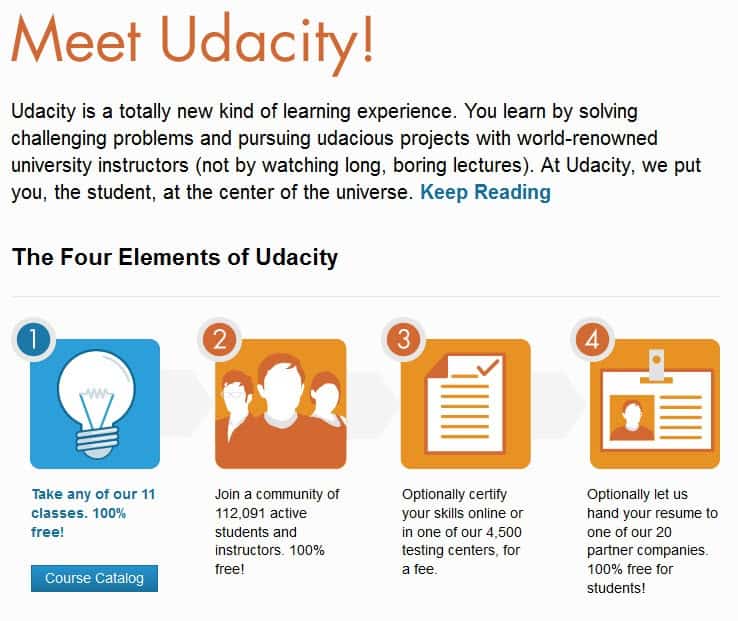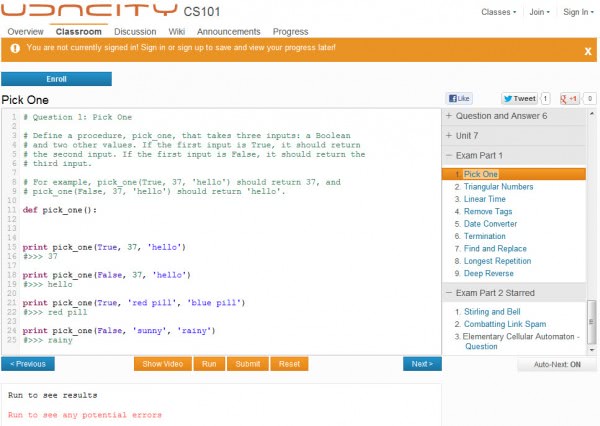Udacity offers free university grade online courses

The Internet has made available a wealth of information to a worldwide audience. 20 or so years ago, your only hope of getting a college or university grade application was to spend two, three, four or even more years studying at your learning institute of choice. Depending on the country you have been living in back then, it may not even have been possible for you to get a university degree either because of lack of funding or options.
The rise of the Internet has changed that dramatically. First, only in form of tutorials and free single courses that were available to everyone. Then later on in the form of free university courses, online certification and free-for-all academies.
We have mentioned the excellent educational videos of the Khan Academy before for instance which has a focus on math and science.
Udacity uses a similar approach, but concentrates more on computer science and science in general. While that still means math most of the time, at least the beginning courses do not require any previous experience in the subject area.
As you can see on the screenshot above, taking classes and joining the community is completely free. If you have completed a class, you can optionall get certification for it which is available for e fee.
Here is a list of courses that are currently on offer:
- Intro to Computer Science: Building a search engine (Beginner)
- Intro to Physics: Landmarks in Physics (Beginner)
- Intro to Statistics: Making Decisions based on data (Beginner)
- Algorithms: Crunching Social Networks (Intermediate)
- Logic and Discrete Mathematics: Foundations of Computing (Intermediate)
- Web Application Engineering: How to build a blog (Intermediate)
- Software Testing: How to make software fail (Intermediate)
- Programming Languages: Building a web browser (Intermediate)
- Design of Computer Programs: Programming Principles (Advanced)
- Artificial Intelligence: Programming a robotic car (Advanced)
- Applied Cryptography: Science of Secrets (Advanced)
You can either enroll into a course directly, or preview it for as long as you want. In fact, you can preview it from the beginning to the very end if you want without creating a free account to enroll in it.
Courses are a mixture of instructive videos and questions that you should use to test your knowledge up to that point. This includes multiple choice questions but also programming exercises.
All courses use the Python programming language. If you do not have experience in Python, you should begin with the Intro to Computer Science course as it also acts as an intro to Python of sorts. Each course consists of seven units, one per week, and a finally Exam at the end of the sevenths week.
All instructional videos include captions that can be activated to aid non-native speakers understand the lectures. If you have no troubles reading this blog, you should not really have issues understanding the videos either.
Each course makes available additional material in a Wiki, and a discussion forum where students and instructors can interact with each other directly. There are also sub forums for study groups, extra practice groups and tags for each unit of a class.
I personally like the idea a lot, especially since you can complete the classes in your own pace. Have you been to Udacity before? If so, what is your experience?
Advertisement



















This is interesting review of Udacity.
I gather comments on Udacity courses on my site http://myeducationpath.com/courses/vendor_1/Udacity.htm . If you have any comments about any Udacity course please share them.
Completed the original AI-Class successfully. Couldn’t wait for more courses. Got excited about ‘Programming Languages: Building a web browser’. Enrolled. Got frustrated with lack of Python skills halfway though. Un-enrolled. Felt sad. Brushed myself up after few days of moping. Enrolled in ‘Intro to Computer Science: Building a search engine’. Learnt to Love Python!. Got distracted by ‘Intro to Statistics: Making Decisions based on data’. Completed ‘Intro to Computer Science: Building a search engine’ with ‘Highest Distinction’. Now back to completing ‘Intro to Statistics: Making Decisions based on data’. But cant wait to get back to ‘Programming Languages: Building a web browser’ with all the newly acquired Python-foo! LIFE IS GOOD ! Thanks Udacity and all other MOOC pioneers!
Sounds like you learned a lot, that is great.
[I made small changes and corrections in this version of my comment. Please consider this version.]
I’ve completed 3 courses at Udacity and 1 at Coursera. I’ve already have a college degree. I think that much of MOOC criticism have corporative motivation or lack of vision. They are an effective and cheap way of acquiring knowledge and making the world a better place, more egalitarian and, above all, allowing people to have tools to innovate and create solutions for a better world wherever they are. Just as Google recovery and deepens the Enlightenment idea of encyclopedism, MOOCs resume the bold idea of ​​Francis Bacon of a society which, through experimentation, can overcome all its problems.
Will Udacity succed? It has great chances because the team include very intelligent people which have made rapid and wise movements. We’ll see how competent Udacity is after its first certification tests (I find it a bit strange a Udacity test without programming problems…). I want to take in person certification for all Udacity courses I finished.
The vast majority of people would never have the time or money required to attend presentially an elite university (Stanford, MIT, Harvard). But technology may allow an educational experience that has some advantages and some disadvantages compared to traditional elite schools. The advantages include:
1) Be able to learn from anywhere, even if you are in a poor country (it’s my case);
2) Cost infinitely smaller;
2) Enjoy benefits of technology (enable teachers to go tweaking and refining their lessons from data collected from thousands or millions of people);
3) Achieve more than one formation or change your career returning to University;
4) You can have classes with the greatest minds in the world (and not only with the greatest minds in your neighborhood). Be a student of Sebastian Thrun and Peter Norvig is a great privilege.
The disadvantages seem small when compared with the advantages:
1) Losing the (amazing) opportunity of living with other smart people in beautiful buildings surrounded by fragant palm trees. This disadvantage can be at least partially overcame with summer schools and meetings of local groups. The MOOC’s DNA is social.
2) Little direct attention from faculty. This supposed great advantage of the presential universities (like argued here: ow.ly/bYeRu) is more idealized than effective. It can be overcome with a combination of automated feedback (including adoption of artificial intelligence techniques), forums, summer schools, local meetings etc. Participation should be strongly encouraged and rewarded (should count on Udacity grades, perhaps as some sort of extra points).
3) Finally, the great disadvantage: having a degree (a degree?) that, at least for a while, will have a lower status than that conferred by traditional institutions. Education is closely linked the idea of ​​credentials, with names referring to philanthropists (Stanford, Harvard, etc..) or geographic areas (MIT, UC). Thus, when we face funny names like “Floating Universityâ€, “UniversityNowâ€, “Charter University†or Udacity we immediately feel something is missing… Even here Salman Khan took a step in the right direction putting his name in Khan Academy. I wonder if Khan Academy would have the same success if Sal had chosen a cute name. This also helps explain why, with little advertising, the 2011 STANFORD ai-class (of Thrun and Norvig) got the attention of 160,000 guys, but now, even with more courses, wide dissemination and a improved platform, Udacity has difficulties to go beyond that record (in a single class).
I think Udacity should look a little bit more like a university (considering the possibility of providing educational credits, as Straighterline does). If they manage to do that, I think team Udacity will have an world positive impact. And as a side effect, they will earn a lot (and well deserved!) money on it.
Done, thanks for your insightful post.
Udacity is the best MOOC. It truly focuses on the student and his/her learning curve. I am half way in CS101 and it really changed my life to the better. I wish Udacity all the best and wish every one a better learning experience in their lives.
Udacity courses are amazing. I completed CS101 (intro. computer science), and am currently enrolled in several more including statistics, physics and algorithms. Their courses focus on learning by problem solving and on building useful skills. I find a hexamester (6 weeks of learning+1 week for the final exam) to be a good length to have a focused learning experience. The professors are genuinely interested in innovating the pedagogy to help the students learn more effectively. Udacity students also provide active support in the forums to the fellow students. Anybody interested in STEM courses should definitely give it a shot.
Took CS373 and loved it. The downside, though, is that I now have house full of robotic parts, and eager to learn more and more. Which is a real problem, you know: you need to get time somewhere. Anyway, it was the best course I had so far (I’m BSc, took lots of courses and summer schools since then).
Wait a second, there’s one course which will be on par: Alex Aiken’s Compilers course on Coursera. Take both, and have fun.
Udacity is great!
I loved the curse on app engine and python. The best resource out there to learn how to create web applications.
When there is a C# course I would create an account right now. Hopefully in the future :)